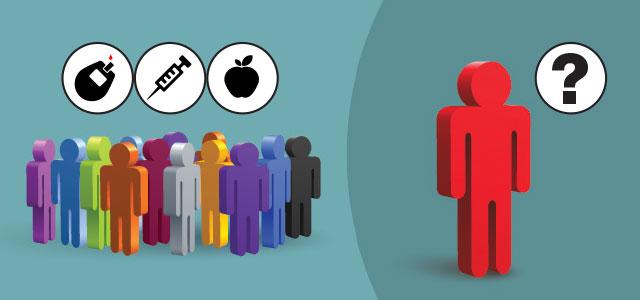
Commentary: How Can We Serve Individual Needs with One-Size-Fits-All Patient Education?
A 19-year-old male is admitted to the emergency room for diabetic ketoacidosis, a medical emergency that arises from dangerously high levels of blood sugar. During his three-day stay, he meets a myriad of practitioners – ER physicians, pediatricians, nurses, nurse practitioners, hospital social workers and diabetic educators – each of whom delivers a lengthy lecture on glucose, insulin and pancreatic insufficiency.
When asked if he has questions, he always smiles and says no. This is the first time he’s learning about diabetes, let alone his diagnosis of it, so questions would be understandable. But my patient – let’s call him John – is always smiling and nodding, frequently described as “very pleasant” in caregivers’ notes.
Here’s what they missed: John has a developmental cognitive disability. He lives in a home with others with developmental disabilities, works part-time at a pizzeria and has a history of alcohol abuse. His girlfriend’s name is tattooed on his forearm; they’ve been together for three years. His professional support is limited to the overburdened social worker who occasionally appears at his bedside.
The morning I meet him, John has stacks of diabetes workbooks and information sheets by his bed. Every provider that enters his room asks whether he’s taken a look at them. In response, John shakes his head slowly, embarrassed. Brusquely and seemingly understandingly, each provider replies, “Too boring, huh?” During my shift, the diabetes educator adds her handouts to the growing stack. After a lesson on dietary labels, serving sizes, carbohydrate counts and insulin units, she asks John to calculate how much insulin to self-inject before his meal of pasta and salad.
John is lost. After an hour of professionally delivered patient education, he cannot say how many cups of what ingredients were in the meal, how to convert them into carbs or how to convert that into the insulin to be injected.
What went wrong here? How did a team of caring professionals at a top-notch medical facility fail so miserably at teaching a patient to self-manage his diabetes?
The first and most obvious problem is that this was diabetes education on autopilot. No one ever assessed John’s reading level. No one knew that algebra was not part of his basic skill set. No one seemed to assess whether John cooked his own meals. And his history of alcohol abuse never figured into the basic educational approach – despite the fact that alcohol can easily send a diabetic patient into dangerous medical emergencies.
That’s not just bad for John; it’s bad for all of us, because poorly delivered diabetes education is expensive. In John’s case, numerous medical practitioners gave lengthy, seasoned diabetes didactics and meticulously charted their diabetes education – and the time of health care practitioners isn’t cheap. But if they can’t help John find realistic ways to manage his diabetes and understand the risks of excessive sugar intake, alcohol use and neglecting insulin, then what’s the point? Especially if John winds up back in the emergency room on a regular basis?
Contrast that with a team that conducts a thoughtful, sensitive patient assessment that uncovers John’s particular needs and then tailors the intervention accordingly. In an age of smartphones – John has one – we might streamline the hours of labor-intensive patient education, much of it spent on remedial algebra, into a few simple sessions with a diabetes app that does the calculations for him. The combination of a less robotic assessment with an awareness of the power of technology might have made it possible to deliver higher-quality, more efficient care at a lower cost.
John’s situation, of course, is not unique.
Even at the finest institutions, often with the best of intentions, busy providers can lose sight of the people at the heart of what we’re doing: our patients. But if we in health care continue to blind ourselves to the patient experience, focusing only on repetitive task completion, we will continue to endanger these patients. When people like John keep turning up in our ERs with diabetes-related emergencies, we will label them noncompliant frequent flyers, rather than looking at our own culpability.
I have no doubt that most health care practitioners are smart, creative and resourceful – and want to make a difference. But for everybody’s sake, we have to remember to engender and maintain cultures that are patient-centered, rather than task-focused.
Elizabeth Ren is a candidate for a master’s degree in psychiatric nursing at UCSF School of Nursing. She earned her undergraduate degree in philosophy-neuroscience-psychology from Washington University in St. Louis, and began her nursing career through the Master’s Entry Program at UCSF. Prior to beginning her nursing career, she worked with individuals who have overcome mental illness, homelessness, chronic illness and incarceration. Through her education at UCSF, she hopes to reshape the way our culture understands mental illness, as well as the ways to create systems of healing and promote mental wellness.



